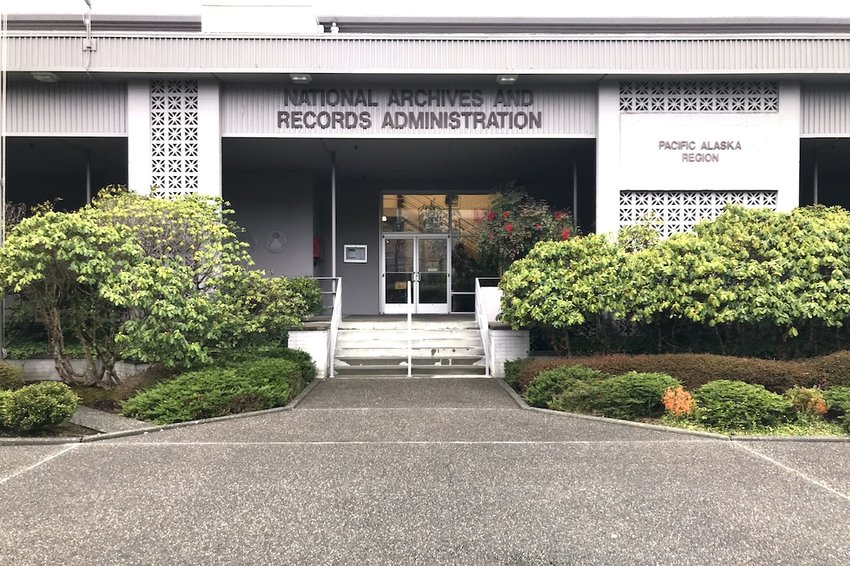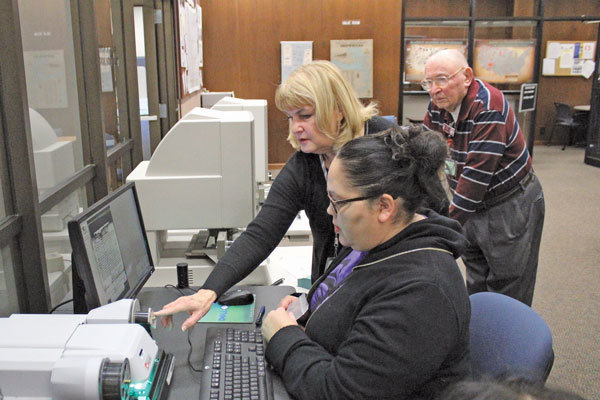 The National Archives and Records Administration facility in Seattle has been slated for closure and sale. Photo: Joseph Pentheroudakis, KP News
The National Archives and Records Administration facility in Seattle has been slated for closure and sale. Photo: Joseph Pentheroudakis, KP News
Editor's note: This article has been updated with Washington A.G. Bob Ferguson's recent efforts to ensure that historic archival materials remain in Washington.
The community of Northwest archivists, historians, genealogists and writers as well as many ordinary citizens were shocked at the announcement in January that the National Archives facility in Seattle, containing records from the Pacific and Alaska regions, had been selected for closure and eventual sale. The 56,000 cubic feet of archives would be consolidated into the National Archives center in Riverside, California, while federal records would be relocated to Kansas City, Missouri.
The facility, operated by the National Archives and Records Administration (NARA), was one of 12 “underutilized high-value” assets nationwide selected by the Public Buildings Reform Board (PBRB) for closure and sale mandated by the 2016 Federal Assets Sale Transfer Act (FASTA). The board consists of experts in government procurement, real estate and community development and is reviewing the government’s real estate portfolio to recommend properties for disposition to the Office of Management and Budget (OMB).
FASTA requires the OMB to approve or reject the full slate of recommendations; the agency is not allowed to reject the sale of individual properties on the list.
The early logging and homesteading days on the Key Peninsula and neighboring areas are also represented in the archives.
According to the reform board report, the 1973 Seattle building has a deferred maintenance backlog of $2.5 million. The report adds that “NARA has indicated its willingness and desire to consolidate operations at more modern facilities.”
NARA has requested to be allowed to stay at the Seattle facility for an additional three years following the sale.
The Seattle facility is located in U.S. Rep. Pramila Jayapal’s district; according to Jayapal, her office received notice of the closure in November and offered to help with public outreach, but the board did not follow up.
The archives contain original documents, photographs and maps from Alaska, Washington, Oregon and Idaho as well as microfilm records representing a direct link to over 150 years of history in the Pacific Northwest.
Although NARA has been digitizing its archives, to date only a small portion of the enormous volume of material has been scanned and made available online.
Among the original files and microfilm records at the Seattle archives are documents relating to the 1882 Chinese Exclusion Act, the first significant law restricting immigration into the United States, and transcripts and decisions by U.S. District Courts, such as the 1974 Boldt decision that reaffirmed the rights of Indian tribes to fish at their accustomed places as guaranteed by treaties.
 A member of the Tulalip Tribes, Chelsea Craig, is searching for documents about the tribe’s history, assisted by volunteers Janice Hemingway and Dick Hall. Credit KUOW Photo/Deborah Wang
A member of the Tulalip Tribes, Chelsea Craig, is searching for documents about the tribe’s history, assisted by volunteers Janice Hemingway and Dick Hall. Credit KUOW Photo/Deborah Wang
Documents relating to native tribes and their interactions with the federal government are a particularly significant part of the archives. Records from the Office of Indian Affairs, Indian Agent reports, correspondence between Indian agents and superintendents and commissioners, reservation and allotment records, censuses and marriage records are all available at the archives and have been used in legal proceedings as well as in tribal affairs for decades.
The early days on the Key Peninsula and neighboring areas are also represented in the archives. Articles on the early settlers on Herron Island published in the Key Peninsula News have relied on records available at the Seattle facility.
Local writer Greg Spadoni has also drawn on the archives. “Stories I wrote on logging railroads in Rosedale and Minter include information from Admiralty Court and McNeil Island Federal Penitentiary,” he said. “Those records are not available anywhere else than the National Archives in Seattle.”
Organizations and institutions were quick to react to news of the closure. Stephanie Lile, director of the Harbor History Museum in Gig Harbor, said that the museum signed a letter to the OMB by the Heritage League of Pierce County urging reconsideration of the decision. “While I understand that archive buildings have to meet rigorous safety standards to protect the archives, to relocate the entire PNW collection to a distant location will have serious implications for researchers throughout the Northwest,” she said. “Most researchers are independent scholars or volunteers working with a modest or nonexistent budget. As a result, having to make the trek to a distant state will pose an even greater barrier to accessing the primary documents so critical to in-depth scholarship.”
Washington Secretary of State Kim Wyman released a statement Jan. 27 offering her assistance in the effort to keep the archives in the Northwest. “My staff and I are ready and willing to work with our congressional delegation, National Archives, and the historical records community to discuss alternative solutions to the closure of this facility for the continued regional access and storage of these important documents,” she said.
Jennifer Kilmer, director of the Washington State History Museum, underscored the importance of offering access to original documents in a statement released Jan. 31: “As history professionals whose mission and practice it is to collect, preserve, and interpret historical artifacts, objects, documents, photographs and ephemera, we know firsthand the research value that lies in the authentic article,” she said. “That is something that cannot be replicated in a digital facsimile.”
The Northwest congressional delegation signed a letter to the OMB requesting that the decision be reconsidered and the public be included in the process. The Muckleshoot Tribal Council is also working with its U.S. congressional delegation hoping to block the sale.
In a letter to the OMB and the PBRB dated Feb. 25 Washington Attorney General Bob Ferguson requested that the agencies reconsider their decision in light of the harm the closure would cause to the community. Ferguson also threatened to sue, charging that the manner in which the decision was reached violated FASTA and several other statutes. He asked for a response to the letter by March 18.
In a subsequent letter to the OMB dated March 5 Ferguson proposed that the Seattle facility be sold as proposed and a portion of the proceeds from the sale be used to ensure that all historic archival material remain in Washington. On March 23 Ferguson met with Assistant U.S. Attorney Brian Kipnis and NARA General Counsel Gary M. Stern; discussions currently are underway to identify an appropriate facility to house the archives.
UNDERWRITTEN BY THE FUND FOR NONPROFIT NEWS (NEWSMATCH) AT THE MIAMI FOUNDATION, THE ANGEL GUILD, ADVERTISERS, DONORS AND PEOPLE WHO SUPPORT INDEPENDENT, NONPROFIT LOCAL NEWS